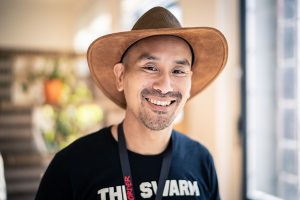Parity to Help Zcash (the Currency) Gain Independence From Zcash (the Startup) FEATURE Oct 30, 2018 at 11:59 UTC | Updated Oct 30, 2018 at 12:55 UTC
The privacy-centric zcash cryptocurrency just took a small step toward greater decentralization.
Revealed exclusively to CoinDesk, ethereum-focused startup Parity Technologies is partnering with the non-profit Zcash Foundation to create the first zcash node software that isn’t built or managed by the Zerocoin Electric Coin Company led by Zooko Wilcox .
As part of that shift, the foundation is looking to hire four engineers to manage development and upkeep for open-source projects. Meanwhile, Parity CTO Fredrik Harrysson told CoinDesk his startup will have two engineers devoted to building this new zcash node.
“Zcash holds, obviously, a special place in this ecosystem. It’s one of few zero-knowledge proof-oriented approaches to privacy,” Harrysson said, referring to a cryptographic method that allows systems to verify a calculation or transaction without revealing its details. “Building that zero-knowledge proof expertise in our company is really important.”
This move also shows how the Zcash Foundation is looking to prioritize decentralization, given that until now, development of the privacy coin was dominated by Wilcox’s startup.
By the end of 2019, zcash users will be able to choose which software to implement. Both options will be almost identical, but it may not always be that way.
“Philosophically, both the foundation and the zcash startup are fork -friendly,” the Zcash Foundation’s communications manager, Sonya Mann, told CoinDesk, meaning they don’t object to anyone creating splinter versions of the cryptocurrency. “If, down the road, issues arose that lead to a fork, I can see it happening amicably, which I think is highly unusual .
”
Since Wilcox himself told CoinDesk in June that the zcash community needs multiple parties adding checks-and-balances to the overall system, the startup’s notable absence from this project shows how the foundation is maturing on its own trajectory. Mann called the Parity partnership an “important milestone” for the zcash community at-large.
Speaking to that point, Harrysson added that having multiple implementations can lead to more diverse contributions and secure systems.
“It fosters more developers.
Maybe C++ isn’t something that everyone wants to get involved with,” he said, naming a programming language by way of example. “In ethereum, that [multiple implementations] has often led to performance improvements, in shielded transactions especially” – i.e. those that take advantage of zero-knowledge proofs’ privacy enhancements. Building bridges
Beyond bolstering options for zcash users, this collaboration will help Parity develop expertise for its upcoming interoperability solution, Polkadot , which aims to allow transactions across and between different blockchains.
“We want to launch Polkadot with a zcash bridge from day one,” Harrysson said. “We believe that zcash has some big feature sets to add to this interoperability. ”
Most notably, this zcash node will make use of Parity’s libraries for Rust , a programming language often used for projects related to bitcoin.
Harrysson said investing in this infrastructure will make it easier to eventually build bridges between blockchains, such as bitcoin and zcash or ethereum.
“Polkadot is a sharding method at the end of the day, so we may be able to see some sharding benefits for zcash with this,” he added, referencing how polkadot will also include scaling solutions. “Having different implementations, we’ve found in ethereum that it means you have people coming at solutions with different approaches.”
From Harrysson’s perspective, collaborations between companies in different crypto communities can pave the way for more organic, decentralized contributions down the road.
“Ultimately, decentralization comes from no companies, no foundations, it should be completely spread out where developers across the world independently contribute to the ecosystem,” he said. “Hopefully, though, this collaboration could lead to that.”
Referring to the human resources both his company and the foundation are contributing, Harrysson added:
“Without this starting capital, I think it’s hard to make something like this happen just naturally.”
Zcash image via Shutterstock The leader in blockchain news, CoinDesk is a media outlet that strives for the highest journalistic standards and abides by a strict set of editorial policies .
CoinDesk is an independent operating subsidiary of Digital Currency Group, which invests in cryptocurrencies and blockchain startups. .
